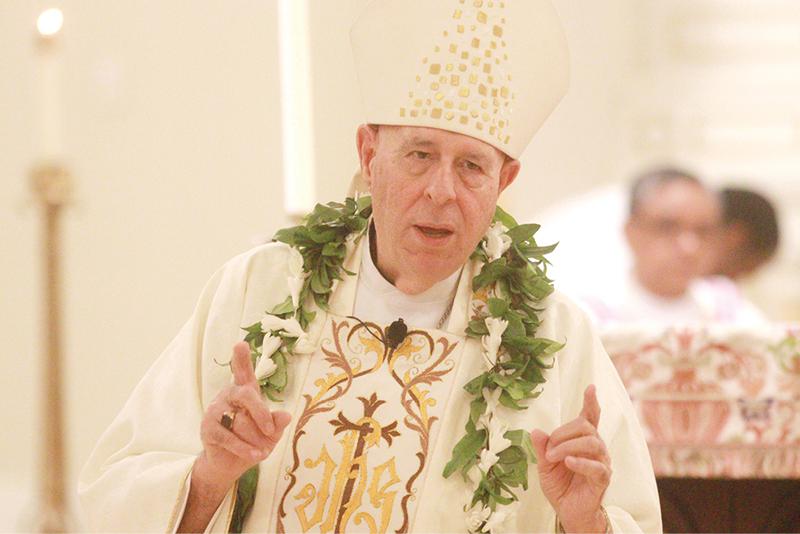|
Reporting abuse by bishops now easier with new service
By Patrick Downes
In the United States, accusations of sexual abuse by clergy are to be reported to the local bishop. But what if it’s the bishop himself who is the problem? The answer is the national Catholic Bishop Reporting Service. Begun March 16, the Catholic Bishop Abuse Reporting (CBAR) is a third-party service that collects and reports to appropriate church authorities bishops who have committed sexual abuse or who have interfered with a civil or church investigation into allegations of sexual abuse by another cleric or religious. This service is welcomed by Bishop Larry Silva. “We have all become aware in recent years that some bishops have committed the sinful crime of abusing minors,” he said. “Just as we hold priests, deacons and other church workers accountable for these horrendous crimes when they are reported to us, bishops, too, need to be held accountable.” “Since bishops are responsible for initiating investigative processes and for imposing penalties for crimes committed in their dioceses, this new mechanism will assure that someone other than the accused bishop will investigate the matter,” the bishop said. “This also applies to bishops who have been derelict in their duties of dealing with cases of sexual abuse of minors in their dioceses,” Bishop Silva said, “so that they can be held accountable for this neglect as well.” “If this mechanism is to be effective, it must be known, and so it is important that people be aware of this service,” he said. “Of course, we pray that there will be no need to use this process because bishops are doing what we are supposed to do,” he said, “but it is important to have the process in place.” Reports to CBAR can be made at ReportBishopAbuse.org or by calling 800-276-1562. They may be done anonymously. Any data submitted will be protected through enhanced encryption. Reports are kept confidential, though crimes, such as the possession of child pornography, will be reported to civil officials. The report is sent to two people: the metropolitan archbishop of the bishop in question and a layperson pre-selected by the archbishop. (For example, the Diocese of Honolulu is a suffragan diocese of the metropolitan Archdiocese of San Francisco, whose archbishop is Salvatore J. Cordileone.) The Vatican will then determine how the investigation is to be conducted. If the metropolitan archbishop is the one accused, the report goes to the senior suffragan bishop and his appointed layperson. The senior suffragan of the San Francisco metropolitan archdiocese is Bishop Robert Vasa of Santa Rosa. The person submitting a report will be given an access number and personal password that can be used to follow the report’s status. This service is not to be used to report other complaints against a bishop, such as theological concerns, liturgical abuses, church closings and priest assignments. Nor should it be used to report priests, deacons or religious. All criminal behavior should be reported first to the police, then to the pastor or parish administrator or school principal and the bishop. Contact the Office of the Bishop at (808) 585-3356 or bishop@rcchawaii.org. Bishop Silva said there are reasons why the Catholic Bishop Reporting Service was not implemented earlier. “I believe that crimes committed by bishops were not revealed as quickly as were crimes committed by priests, so that was part of the reason for the delay,” he said. “Another is that only the pope can effectively discipline a bishop, so the mechanism must be something that applies to bishops all over the world with a process approved by the Holy Father.” “It is a rather complicated process that holds the value of a bishop not policing himself, yet that is acceptable in a wide range of cultures,” the bishop said. “To develop such a process was complex, but now it is in place.” Providing this third-party reporting system is Convercent Inc., a commercial vendor of ethics reporting services. It is paid for by the 197 dioceses and eparchies of the United States and is operated by the metropolitan archbishops and senior suffragan bishops of each province, with the assistance of the designated laypeople. Convercent does not conduct any investigation. It only gathers and routes reports to the appropriate church officials. CBAR is a response to Pope Francis’ document “Vos Estis Lux Mundi” (“You are the Light of the World”), promulgated as a result of the February 2019 meeting with presidents of the world’s bishops conferences regarding sexual abuse issues in the church. For more information about CBAR or clergy sexual abuse in general, contact Kristin Leandro, diocesan Safe Environment Director, at kleandro@rcchawaii.org or (808) 203-6719.
|
.
Any original material on these pages is copyright © BishopAccountability.org 2004. Reproduce freely with attribution.
